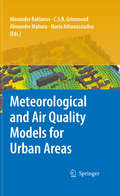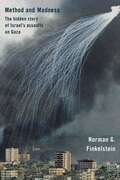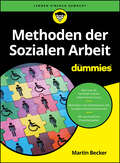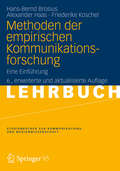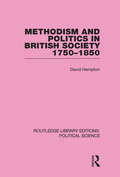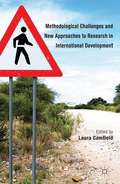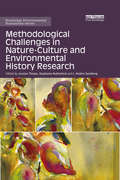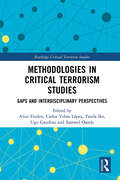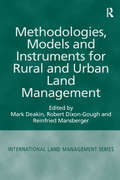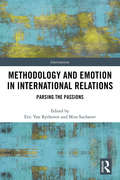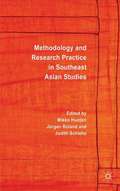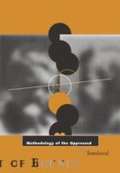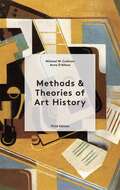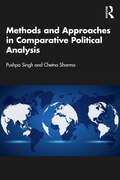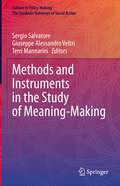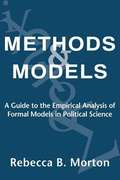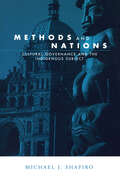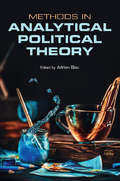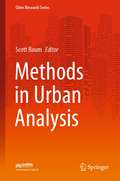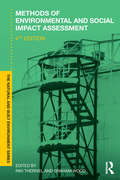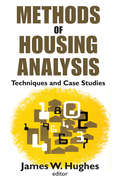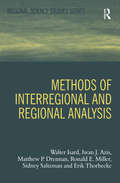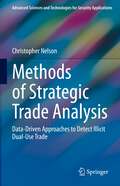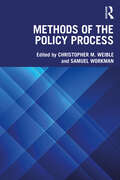- Table View
- List View
Meteorological and Air Quality Models for Urban Areas
by Alexander Baklanov Maria Athanassiadou Sue Grimmond Alexander MahuraThis book for the first time gives an overall view of the current situation in urbanization of meteorological and air quality models around the world. It discusses and makes recommendations on the best practice and strategy for urbanization of different types of meteorological and air quality models. Based on the selected presentations given at the COST728 workshop, the contributions are arranged in four parts: urban morphology and databases; parameterizations of urban canopy; strategy for urbanization of different types of models; and evaluation and city case studies / field studies. The chapters treat either dynamic (on wind and turbulent) and thermal effects (on temperature and energy in general). The final chapter of this volume summarizes the discussion and conclusions from the four main topics and provides recommendations and future requirements. This monograph is oriented towards numerical weather prediction and air quality modelling communities.
Method And Madness: The Hidden Story of Israel's Assaults on Gaza
by Norman G. FinkelsteinIn the past five years Israel has mounted three major assaults on the 1.8 million Palestinians trapped behind its blockade of the Gaza Strip. Taken together, Operation Cast Lead (2008-9), Operation Pillar of Defense (2012), and Operation Protective Edge (2014), have resulted in the deaths of some 3,700 Palestinians. Meanwhile, a total of 90 Israelis were killed in the invasions. On the face of it, this succession of vastly disproportionate attacks has often seemed frenzied and pathological. Senior Israeli politicians have not discouraged such perceptions, indeed they have actively encouraged them. After the 2008-9 assault Israel's then-foreign'minister, Tzipi Livni, boasted, "Israel demonstrated real hooliganism during the course of the recent operation, which I demanded." However, as Norman G. Finkelstein sets out in this concise, paradigm-shifting new book, a closer examination of Israel's motives reveals a state whose repeated recourse to savage war is far from irrational. Rather, Israel's attacks have been designed to sabotage the possibility of a compromise peace with the Palestinians, even on terms that are favorable to it.
Methoden der Sozialen Arbeit für Dummies (Für Dummies)
by Martin BeckerDas Handwerkszeug für Fachkräfte Sozialer Arbeit Soziale Arbeit ist mehr als nur Hilfe zur Selbsthilfe – sie ist eine komplexe Wissenschaft, die Theorie und Praxis miteinander verbindet. In diesem Buch erfahren Sie, wie Sie die Methoden der Sozialen Arbeit in der Praxis effektiv anwenden können. Wie finden Sie die Interessen der Menschen in einem Stadtteil heraus? Wie gewinnen Sie das Vertrauen Ihrer Klienten und bewahren gleichzeitig den nötigen Abstand? Mit zahlreichen Beispielen aus dem Arbeitsalltag ist dieses Buch ein wertvoller Begleiter für alle, die sich für die Methoden Sozialer Arbeit interessieren. Sie erfahren Welchen Auftrag Fachkräfte Sozialer Arbeit haben Wie vielfältig die Methoden Sozialer Arbeit sind Wie Sie die passenden Methoden effektiv einsetzen Wie wirksam Soziale Arbeit sein kann
Methoden der empirischen Kommunikationsforschung
by Friederike Koschel Alexander Haas Hans-Bernd BrosiusDieses Buch ist eine Einführung in die wesentlichen Methoden der empirischen Kommunikationswissenschaft. Es wendet sich insbesondere an Studierende der Kommunikations- und Medienwissenschaft, die erste Erfahrung mit empirischen Methoden sammeln, und eignet sich als vertiefende Begleitung einführender Vorlesungen und als praxisorientierte Handreichung für Methodenübungen. Leichte Verständlichkeit, Anwendungsorientierung und eine klare Gliederung sind die Haupteigenschaften dieses Lehrbuchs.
Methodism and Politics in British Society 1750-1850 (Routledge Library Editions: Political Science #31)
by David HemptonOriginally published in 1984, this book charts the political and social consequences of Methodist expansion in the first century of its existence. While the relationship between Methodism and politics is the central subject of the book a number of other important themes are also developed. The Methodist revival is placed in the context of European pietism, enlightenment thought forms, 18th century popular culture, and Wesley’s theological and political opinions. Throughout the book Methodism is treated on a national scale, although the regional, chronological and religious diversity of Methodist belief and practice is also emphasized.
Methodological Challenges and New Approaches to Research in International Development
by Laura CamfieldAn expansion in funding for 'basic' research has provided space for development researchers to reflect on their practice and on their ethical responsibility to do research that is 'accountable and of the highest quality' (ESRC Framework 2006). The growth in qualitative as well as quantitative data archiving, which is now a requirement of many funders, brings these issues to the fore. For secondary data to be usable there needs to be a robust methodological account reflecting on the challenges of data production and the implications of these for potential conclusions. The recent emphasis on evidence-based policy making by DFID means it is doubly important to ensure that quantitative and qualitative studies make full disclosure of their methods of data production and analysis, although there is little guidance provided in relation to this. This volume responds to these challenges, drawing on best practice from other fields, and provides a fresh perspective on perennial debates such as how to integrate qualitative and quantitative approaches and the relationship between data and theory.
Methodological Challenges in Nature-Culture and Environmental History Research (Routledge Environmental Humanities)
by L. Anders Sandberg Jocelyn Thorpe Stephanie RutherfordThis book examines the challenges and possibilities of conducting cultural environmental history research today. Disciplinary commitments certainly influence the questions scholars ask and the ways they seek out answers, but some methodological challenges go beyond the boundaries of any one discipline. The book examines: how to account for the fact that humans are not the only actors in history yet dominate archival records; how to attend to the non-visual senses when traditional sources offer only a two-dimensional, non-sensory version of the past; how to decolonize research in and beyond the archives; and how effectively to use sources and means of communication made available in the digital age. This book will be a valuable resource for those interested in environmental history and politics, sustainable development and historical geography.
Methodologies in Critical Terrorism Studies: Gaps and Interdisciplinary Perspectives (Routledge Critical Terrorism Studies)
by Carlos Yebra López Tarela Ike Ugo Gaudino Samwel Oando Alice FindenThis interdisciplinary book presents an intervention into methodological practices in the subfield of Critical Terrorism Studies, and features established and early career scholars. The volume interrogates the role that research methods play in shaping the sub-discipline of Critical Terrorism Studies (CTS). It responds to two major methodological gaps within CTS: (1) the dearth of Global South cases and voices, and decolonial and feminist approaches; and (2) the lack of engagement with ‘traditional’ disciplines and quantitative methods. Together, authors demonstrate that interdisciplinary methodological dialogues can open up new possibilities for researchers seeking pathways towards and definitions of emancipation, social justice and freedom from violence. Simultaneously, the book shows that by focusing on the possibilities that methodologies open up to us and by maintaining a commitment to reflexive practice, we expand our understandings of what are ‘legitimate’ and ‘acceptable’ forms of research, thus challenging the Critical/Terrorism Studies divide. The chapters draw upon a wide range of empirical cases, including Nigeria, Kenya, France, Brazil and the UK, focusing on three key issues within Critical Terrorism Studies: its own relationship with and perpetuation of epistemic violence; decolonial, postcolonial, Global South, feminist and queer approaches; and more ‘traditional’ approaches and methods as a means to interrogate the methodological binary between Critical Terrorism Studies and Terrorism Studies. This book will be of much interest to students of critical terrorism studies, counter-terrorism, security studies and International Relations in general.
Methodologies, Models and Instruments for Rural and Urban Land Management (International Land Management Series)
by Mark DeakinIllustrated with empirical case studies from Europe, Africa and North America, this book provides an overview of the wide range of innovative methodologies, models and instruments currently being applied in the formation of and implementation of land management strategies. It examines techniques such as data acquisition, data modelling, the legal instruments of land management and structural theories and applications ranging from historic land use to current programmes of urban redevelopment. It then shows how these advance land management and development in practice.
Methodology and Emotion in International Relations: Parsing the Passions (Interventions)
by Mira Sucharov Eric Van RythovenThis volume offers a state-of-the-art study of the diverse methodological approaches and issues in the study of emotions in international relations research. <P><P> While interest in emotion and affect in IR has grown in recent years, there remains an absence of sustained engagement with questions of methodology and method. Although much of the field holds the ‘emotions turn’ as laudable, it is commonly seen as facing serious, even prohibitive, methodological challenges. <P><P> Using a common framework for making discussions of methodology and emotion mutually intelligible, this work seeks to address this lacuna and will be of interest to students and scholars of international relations, research methods and IR theory.
Methodology and Research Practice in Southeast Asian Studies
by Jürgen Rüland Mikko Huotari Judith SchleheThis book addresses the question of how to ground research practice in area-specific, yet globally entangled contexts such as 'Global Southeast Asia'. It offers a fruitful debate between various approaches to Southeast Asia Studies, while taking into consideration the area-specific contexts of research practice cross-cutting methodological issues.
Methodology of the Oppressed
by Chela SandovalIn a work with far-reaching implications, Chela Sandoval does no less than revise the genealogy of theory over the past thirty years, inserting what she terms "U.S. Third World feminism" into the narrative in a way that thoroughly alters our perspective on contemporary culture and subjectivity. What Sandoval has identified is a language, a rhetoric of resistance to postmodern cultural conditions. U.S liberation movements of the post-World War II era generated specific modes of oppositional consciousness. Out of these emerged a new activity of consciousness and language Sandoval calls the "methodology of the oppressed". This methodology -- born of the strains of the cultural and identity struggles that currently mark global exchange -- holds out the possibility of a new historical moment, a new citizen-subject, and a new form of alliance consciousness and politics. Utilizing semiotics and U.S. Third World feminist criticism, Sandoval demonstrates how this methodology mobilizes love as a category of critical analysis. Rendering this approach in all its specifics, Methodology of the Oppressed gives rise to an alternative mode of criticism opening new perspectives on a theoretical, literary, aesthetic, social movement, or psychic expression.
Methods & Theories of Art History Third Edition
by Michael Cothren Anne D'AllevaThis book is an accessible introduction to the critical theories used in analysing art. It covers a broad range of approaches, presenting individual arguments, controversies and divergent perspectives. This edition has been updated to reflect recent scholarship in contemporary art and has been broken down into smaller sections for greater accessibility. The book begins with a revised discussion of the difference between method and theory. The following chapters apply the varying approaches to works of art, some of them new to this edition. The book ends with a new conclusion that focuses on the way the study of art is informed by theory.
Methods & Theories of Art History Third Edition
by Michael Cothren Anne D'AllevaThis book is an accessible introduction to the critical theories used in analysing art. It covers a broad range of approaches, presenting individual arguments, controversies and divergent perspectives. This edition has been updated to reflect recent scholarship in contemporary art and has been broken down into smaller sections for greater accessibility. The book begins with a revised discussion of the difference between method and theory. The following chapters apply the varying approaches to works of art, some of them new to this edition. The book ends with a new conclusion that focuses on the way the study of art is informed by theory.
Methods and Approaches in Comparative Political Analysis
by Pushpa Singh Chetna SharmaThis book focuses on the methods and approaches in comparative politics while tracing the evolution of the discipline. Exploring its historical legacy through a comparative perspective, it uses research methods and methodologies to critically analyse the approaches used in the book.This unique volume provides an exclusive reading on the dimension of gender in comparative politics. It also investigates the foundational approaches and insights from the perspective of postcolonial societies and diverse regions of the world.Lucidly written to serve a diversity of readership, this book is an invaluable resource for students, researchers, and teachers from the departments of political science, public administration, history, and journalism. Owing to its detailed, diverse, and rich discussions on the different aspects of these themes, it will be equally useful to researchers in the field of gender studies and comparative politics.
Methods and Instruments in the Study of Meaning-Making (Culture in Policy Making: The Symbolic Universes of Social Action)
by Sergio Salvatore Terri Mannarini Giuseppe Alessandro VeltriThis volume develops a theoretical framework for the modelling of meaning-making and cultural processes as crucial to the scientific study of contemporary complex societies. It focuses on the methodological and empirical aspects of the analysis of culture and its dynamics that could be applied to policymaking and to the understanding of social phenomena. It covers culture-based segmentation, ad hoc survey instruments like the VOC and PROSERV questionnaires, discourse flow analysis, the Homogenization of Classification Functions Measurement, and others. It also presents a detailed discussion of the methodology of cultural analysis in contexts of health and education. The volume showcases a top-down approach by including quantitative methods and/or automatized or semi-automatized procedures, and at the same time supports a hermeneutic, bottom-up, abductive approach, focused on the situated dynamics of meaning-making. It provides insights from cultural studies, social statistics, social policy, and research methodology in the social sciences. This is a useful resource for academics involved in studying cultural dynamics and for policy-oriented researchers and decision-makers who are interested in cultural dimensions of the design, implementation and reception of public policies.
Methods and Models: A Guide to the Empirical Analysis of Formal Models in Political Science
by Rebecca B. MortonAt present much of political science consists of a large body of formal mathematical work that remains largely unexplored empirically and an expanding use of sophisticated statistical techniques. While there are examples of noteworthy efforts to bridge the gap between these, there is still a need for much more cooperative work between formal theorists and empirical researchers in the discipline. This book explores how empirical analysis has, can, and should be used to evaluate formal models in political science. The book is intended to be a guide for active and future political scientists who are confronting the issues of empirical analysis with formal models in their work and as a basis for a needed dialogue between empirical and formal theoretical researchers in political science. These developments, if combined, are potentially a basis for a new revolution in political science.
Methods and Nations: Cultural Governance and the Indigenous Subject
by Michael J. ShapiroMethods and Nations critiques one of the primary deployments of twentieth-century social science: comparative politics whose major focus has been "nation-building" in the "Third World," often attempting to universalize and render self-evident its own practices. International relations theorists, unable to resist the "cognitive imperialism" of a state-centric social science, have allowed themselves to become colonized. Michael Shapiro seeks to bring recognition to forms of political expression-alternative modes of intelligibility for things, people, and spaces-that have existed on the margins of the nationhood practices of states and the complicit nation-sustaining conceits of social science.
Methods in Analytical Political Theory
by Adrian BlauThis is the first book to explain how to use key methods in analytical political theory. The methods discussed include contractualism, reflective equilibrium, positive political theory, thought experiments and ideological analysis. Many discussions of political theory methods describe and justify these methods with little or no discussion of their application, emphasizing 'what is' and 'why do' over 'how to'. This book covers all three. Each chapter explains what kinds of problems in political theory might require researchers to use a particular method, the basic principles behind the method being proposed, and an analysis of how to apply it, including concrete principles of good practice. The book thus summarizes methodological ideas, grouped in one place and made accessible to students, and it makes innovative contributions to research methods in analytical political theory.
Methods in Urban Analysis (Cities Research Series)
by Scott BaumThis book highlights major quantitative and qualitative methods and approaches used in the field of urban analysis. The respective chapters cover the background and relevance of various approaches to urban studies and offer guidance on implementing specific methodologies. Each chapter also provides links to real-world examples. The book is unique in its focus on Australian examples and subject matter, presented by recognized experts in the field.
Methods of Environmental and Social Impact Assessment (Natural and Built Environment Series)
by Riki Therivel and Graham WoodEnvironmental and social impact assessment (ESIA) is an important and often obligatory part of proposing or launching any development project. Delivering a successful ESIA needs not only an understanding of the theory but also a detailed knowledge of the methods for carrying out the processes required. Riki Therivel and Graham Wood bring together the latest advice on best practice from experienced practitioners to ensure an ESIA is carried out effectively and efficiently. This new edition: • explains how an ESIA works and how it should be carried out • demonstrates the links between socio-economic, cultural, environmental and ecological systems and assessments • incorporates the World Bank’s IFC performance standards, and best practice examples from developing as well as developed countries • includes new chapters on emerging ESIA topics such as climate change, ecosystem services, cultural impacts, resource efficiency, land acquisition and involuntary resettlement. Invaluable to undergraduate and MSc students of ESIA on planning, ecology, geography and environment courses, this internationally oriented fourth edition of Methods of Environmental and Social Impact Assessment is also of great use to planners, ESIA practitioners and professionals seeking to update their skills.
Methods of Housing Analysis: Techniques and Case Studies
by A. James GregorIn order to understand and formulate housing policy and programs, it is necessary to have a working knowledge of the internal economic operation of housing from the points of view of both the investor and the owner. James W. Hughes argues that investors' and owners' behavior and activity tend to be governed by market forces and other realities. In that regard, he begins this work by analyzing market rates of return in real estate and housing undertakings, and the variety of analytical techniques which underlie their determination.Methods of Housing Analysis is designed to provide urban planners with an introduction to the basic, quantitative techniques associated with the analysis of housing. A myriad of specific analytical methods has evolved in each of the professions concerned with this subject area. Planners, investors, developers, engineers, appraisers, social scientists, and governmental officials all tend to exhibit unique perspectives when examining housing and have developed their analytical frameworks accordingly.The work is comprised of an extensive discussion by the author, detailed case studies and examples, and a number of essays by leading experts that detail specific analytical procedures and demonstrate their use. The book is divided into four major sections: analysis of the internal operation of housing; basic cost-revenue analysis; expanded cost-revenue/benefit analysis; and government regulation of housing. The thorough nature of Hughes' discussion and of the related readings makes this volume an ideal textbook and reference source.
Methods of Interregional and Regional Analysis
by Erik Thorbecke Ronald E. Miller Matthew P. Drennan Iwan J. Azis Sidney Saltzman Walter IsardThis landmark textbook introduces students to the principles of regional science and focuses on the key methods used in regional analysis, including regional and interregional input-output analysis, econometrics (regional and spatial), programming and industrial and urban complex analysis, gravity and spatial interaction models, SAM and social accounting (welfare) analysis and applied general interregional equilibrium models. The coherent development of the materials contained in the set of chapters provides students with a comprehensive background and understanding of how to investigate key regional problems. For the research scholar, this publication constitutes an up-to-date source book of the basic elements of each major regional science technique. More significant, it points to new directions for future research and ways interregional and regional analytic approaches can be fused to realise much more probing attacks on regional and spatial problems - a contribution far beyond what is available in the literature.
Methods of Strategic Trade Analysis: Data-Driven Approaches to Detect Illicit Dual-Use Trade (Advanced Sciences and Technologies for Security Applications)
by Christopher NelsonThis book addresses ways that governments, international organizations, and other stakeholders can utilize data to uncover illicit trade in materials and equipment that could be used to support chemical, biological, nuclear, and advanced conventional weapons systems. Key concepts of strategic trade are introduced, including examples of strategic goods and their potential uses in weapons of mass destruction (WMDs) and weapons systems, the interplay between the Harmonized System and strategic trade control regimes, and the data available for analysis in the field. Innovative, yet practical methodologies to analyze strategic trade cover the use of crime scripts, risk assessment indicators, mirror statistics, market share analysis, and transshipment and re-export analysis. There are also chapters on leading-edge techniques involving machine learning and network analysis that have shown promise in other areas of crime and illicit trade investigations. Each chapter provides step-by-step instructions on applying the technique, numerous case studies and examples, and discussions of the strengths and weaknesses of each approach. This volume is designed to provide all types of analysts with practical pathways for understanding, detecting, and disrupting illicit procurement of materials and equipment needed to produce WMDs and advanced weapons.
Methods of the Policy Process
by Christopher M. WeibleThe increasingly global study of policy processes faces challenges with scholars applying theories in radically different national and cultural contexts. Questions frequently arise about how to conduct policy process research comparatively and among this global community of scholars. Methods of the Policy Process is the first book to remedy this situation, not by establishing an orthodoxy or imposing upon the policy process community a rigid way of conducting research but, instead, by allowing the leading researchers in the different theoretical traditions a space to share the means by which they put their research into action. This edited volume serves as a companion volume and supplemental guide to the well-established Theories of the Policy Process, 4th Edition. Methods of the Policy Process acknowledges that growth and advancement in the study of the policy process is dependent not merely on conceptual and theoretical development, but also on developing and systematizing better methodological approaches to measurement and analysis. To maximize student engagement with the material, each chapter follows a similar framework: introduction of a given theory of the policy process, application of that theory (including best practices for research design, conceptualization, major data sources, data collection, and methodological approaches), critical assessment, future directions, and often online resources (including datasets, survey instruments, and interview and coding protocols). While the structure and focus of each chapter varies slightly according to the theoretical tradition being discussed, each chapter's central aim is to prepare readers to confidently undertake common methodological strategies themselves. Methods of the Policy Process is especially beneficial to people new to the field, including students enrolled in policy process courses, as well as those without access to formal training. For scholars experienced in applying theories, this edited volume is a helpful reference to clarify best practices in research methods.
